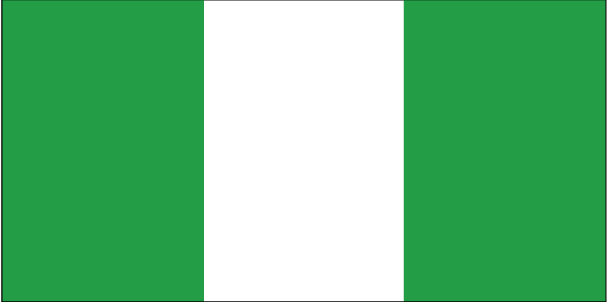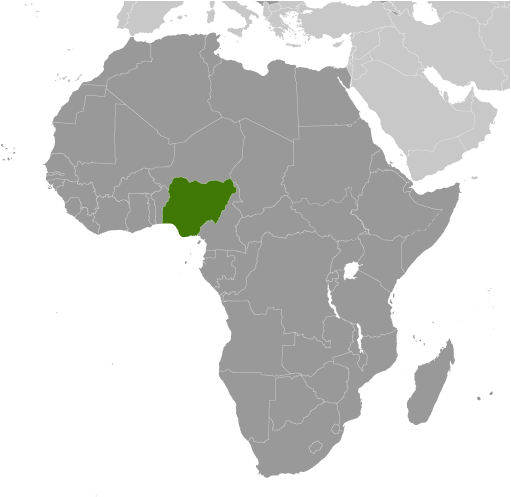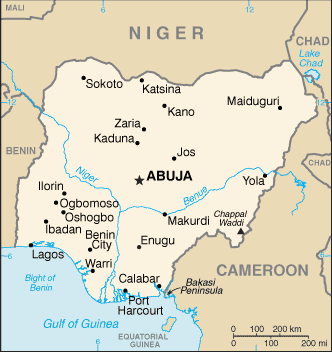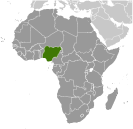
|
|
Advertisements:
EconomyEconomy - overview
Oil-rich Nigeria has been hobbled by political instability, corruption, inadequate infrastructure, and poor macroeconomic management but in 2008 began pursuing economic reforms. Nigeria's former military rulers failed to diversify the economy away from its overdependence on the capital-intensive oil sector, which provides 95% of foreign exchange earnings and about 80% of budgetary revenues. Following the signing of an IMF stand-by agreement in August 2000, Nigeria received a debt-restructuring deal from the Paris Club and a $1 billion credit from the IMF, both contingent on economic reforms. Nigeria pulled out of its IMF program in April 2002, after failing to meet spending and exchange rate targets, making it ineligible for additional debt forgiveness from the Paris Club. In November 2005, Abuja won Paris Club approval for a debt-relief deal that eliminated $18 billion of debt in exchange for $12 billion in payments - a total package worth $30 billion of Nigeria's total $37 billion external debt. Since 2008 the government has begun to show the political will to implement the market-oriented reforms urged by the IMF, such as modernizing the banking system, removing subsidies, and resolving regional disputes over the distribution of earnings from the oil industry. GDP rose strongly in 2007-11 because of growth in non-oil sectors and robust global crude oil prices. President JONATHAN has established an economic team that includes experienced and reputable members and has announced plans to increase transparency, diversify economic growth, and improve fiscal management. Lack of infrastructure and slow implementation of reforms are key impediments to growth. The government is working toward developing stronger public-private partnerships for roads, agriculture, and power. Nigeria's financial sector was hurt by the global financial and economic crises, but the Central Bank governor has taken measures to restructure and strengthen the sector to include imposing mandatory higher minimum capital requirements. Gdp (purchasing power parity) World Ranking: 31
$418.7 billion (2011 est.)
$390.6 billion (2010 est.) $361.8 billion (2009 est.) Note Data are in 2011 US dollars Gdp (official exchange rate)
$238.9 billion (2011 est.)
Gdp - real growth rate World Ranking: 27
7.2% (2011 est.)
8% (2010 est.) 7% (2009 est.) Gdp - per capita (ppp) World Ranking: 178
$2,600 (2011 est.)
$2,500 (2010 est.) $2,400 (2009 est.) Note Data are in 2011 US dollars Gdp - composition by sector
Agriculture 35.4%
Industry 33.6% Services 31% (2011 est.) Labor force World Ranking: 11
52.16 million (2011 est.)
Labor force - by occupation
Agriculture 70%
Industry 10% Services 20% (1999 est.) Unemployment rate World Ranking: 166
21% (2011 est.)
4.9% (2011 est.) Population below poverty line
70% (2007 est.)
Household income or consumption by percentage share
Lowest 10% 1.8%
Highest 10% 38.2% (2010 est.) Distribution of family income - gini index World Ranking: 49
43.7 (2003)
50.6 (1997) Investment (gross fixed) World Ranking: 139
13.8% of GDP (2011 est.)
Budget
Revenues $23.05 billion
Expenditures $31.09 billion (2011 est.) Taxes and other revenues World Ranking: 210
9.6% of GDP (2011 est.)
Budget surplus (+) or deficit (-) World Ranking: 110
-3.4% of GDP (2011 est.)
Public debt World Ranking: 122
17.9% of GDP (2011 est.)
17.8% of GDP (2010 est.) Inflation rate (consumer prices) World Ranking: 195
10.8% (2011 est.)
13.7% (2010 est.) Central bank discount rate World Ranking: 62
4.25% (31 December 2010 est.)
6% (31 December 2009 est.) Commercial bank prime lending rate World Ranking: 27
16.02% (31 December 2011 est.)
17.585% (31 December 2010 est.) Stock of narrow money World Ranking: 50
$38.87 billion (31 December 2011 est.) $34.65 billion (31 December 2010 est.) Stock of broad money World Ranking: 58
$80.1 billion (31 December 2011 est.) $74.08 billion (31 December 2010 est.) Stock of domestic credit World Ranking: 55
$77.96 billion (31 December 2011 est.) $70.1 billion (31 December 2010 est.) Market value of publicly traded shares World Ranking: 52
$39.27 billion (31 December 2011) $50.88 billion (31 December 2010) $33.32 billion (31 December 2009) Agriculture - products
Cocoa, peanuts, cotton, palm oil, corn, rice, sorghum, millet, cassava (tapioca), yams, rubber; cattle, sheep, goats, pigs; timber; fish Industries
Crude oil, coal, tin, columbite; rubber products, wood; hides and skins, textiles, cement and other construction materials, food products, footwear, chemicals, fertilizer, printing, ceramics, steel Industrial production growth rate World Ranking: 113
2.5% (2011 est.)
Electricity - production World Ranking: 70
20.13 billion kWh (2008 est.)
Electricity - consumption World Ranking: 73
18.14 billion kWh (2008 est.)
Electricity - exports
0 kWh (2009 est.)
Electricity - imports
0 kWh (2009 est.)
Oil - production World Ranking: 10
2.458 million bbl/day (2010 est.) Oil - consumption World Ranking: 47
279,000 bbl/day (2010 est.)
Oil - exports World Ranking: 9
2.102 million bbl/day (2009 est.) Oil - imports World Ranking: 49
187,700 bbl/day (2009 est.)
Oil - proved reserves World Ranking: 10
37.2 billion bbl (1 January 2011 est.) Natural gas - production World Ranking: 29
23.21 billion cu m (2009 est.)
Natural gas - consumption World Ranking: 52
7.216 billion cu m (2009 est.)
Natural gas - exports World Ranking: 16
15.99 billion cu m (2009 est.)
Natural gas - imports World Ranking: 105
0 cu m (2009 est.)
Natural gas - proved reserves World Ranking: 8
5.292 trillion cu m (1 January 2011 est.) Current account balance World Ranking: 26
$11.82 billion (2011 est.)
$2.476 billion (2010 est.) Exports World Ranking: 40
$103.9 billion (2011 est.)
$73.7 billion (2010 est.) Exports - commodities
Petroleum and petroleum products 95%, cocoa, rubber Exports - partners
US 28.9%, India 12%, Brazil 7.8%, Spain 7.1%, France 4.9%, Netherlands 4.2% (2011) Imports World Ranking: 47
$69.49 billion (2011 est.)
$53.46 billion (2010 est.) Imports - commodities
Machinery, chemicals, transport equipment, manufactured goods, food and live animals Imports - partners
China 17.5%, US 9.1%, Netherlands 4.9%, India 4.7%, South Korea 4.7% (2011) Reserves of foreign exchange and gold World Ranking: 46
$35.21 billion (31 December 2011 est.) $34.92 billion (31 December 2010 est.) Debt - external World Ranking: 93
$10.43 billion (31 December 2011 est.) $7.883 billion (31 December 2010 est.) Stock of direct foreign investment - at home World Ranking: 44
$76.18 billion (31 December 2011 est.) $69.4 billion (31 December 2010 est.) Stock of direct foreign investment - abroad World Ranking: 51
$10.25 billion (31 December 2011 est.) $9.521 billion (31 December 2010 est.) Exchange rates
Nairas (NGN) per US dollar -
153.9 (2011 est.) 150.3 (2010 est.) 148.9 (2009) 117.8 (2008) 127.46 (2007) Fiscal year
Calendar year
Comments
Add a new comment: |
Advertisement
Members area
Nigeria (Abuja):
 
GPS points from Nigeria (Abuja)
|
||||||||

 British influence and control over what would become Nigeria and Africa's most populous country grew through the 19th century. A series of constitutions after World War II granted Nigeria greater autonomy; independence came in 1960. Following nearly 16 years of military rule, a new constitution was adopted in 1999, and a peaceful transition to civilian government was completed. The government continues to face the daunting task of reforming a petroleum-based economy, whose revenues have been squandered through corruption and mismanagement, and institutionalizing democracy. In addition, Nigeria continues to experience longstanding ethnic and religious tensions. Although both the 2003 and 2007 presidential elections were marred by significant irregularities and violence, Nigeria is currently experiencing its longest period of civilian rule since independence. The general elections of April 2007 marked the first civilian-to-civilian transfer of power in the country's history.
British influence and control over what would become Nigeria and Africa's most populous country grew through the 19th century. A series of constitutions after World War II granted Nigeria greater autonomy; independence came in 1960. Following nearly 16 years of military rule, a new constitution was adopted in 1999, and a peaceful transition to civilian government was completed. The government continues to face the daunting task of reforming a petroleum-based economy, whose revenues have been squandered through corruption and mismanagement, and institutionalizing democracy. In addition, Nigeria continues to experience longstanding ethnic and religious tensions. Although both the 2003 and 2007 presidential elections were marred by significant irregularities and violence, Nigeria is currently experiencing its longest period of civilian rule since independence. The general elections of April 2007 marked the first civilian-to-civilian transfer of power in the country's history.